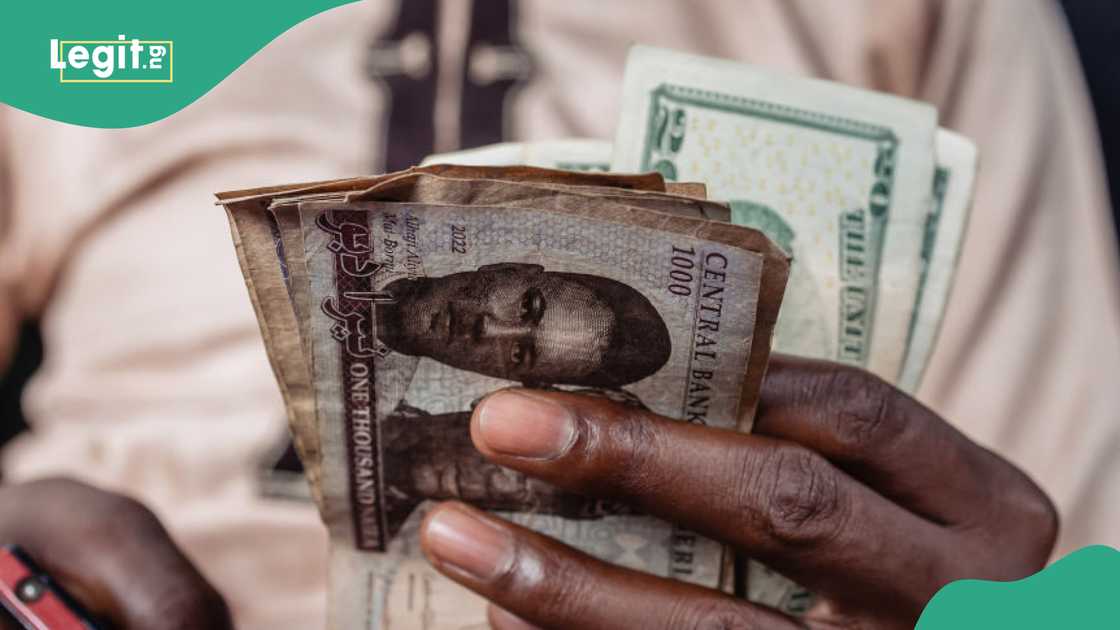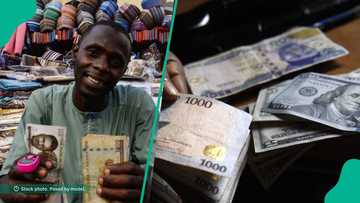Naira Records Slight Depreciation Against US Dollar in Official Market
- The naira has opened the new week on a low in the official market against the United States dollar
- New data showed that the naira was weaker on Monday than the previous week's trading exchange rate
- The depreciation of the naira comes amid the fall in weekly forex inflow into the Nigeria market
Don't miss out! Join Legit.ng's Sports News channel on WhatsApp now!
Legit.ng journalist Dave Ibemere has over a decade of business journalism experience with in-depth knowledge of the Nigerian economy, stocks, and general market trends.
The naira depreciated to N1,536.42 in the Nigerian Foreign Exchange Market (NFEM) on Monday, August 25, 2025.
The naira exchange rate weakened by N1.39 when compared to N1,535.03 at the close on Friday, last week.

Source: Getty Images
Naira rate against the pound, euro
In the official market, the Nigerian currency slumped against the British pound, losing N14.31 to close at N2,075.71/£1 compared with the preceding session’s N2,061.40/£1.
It also weakened against the euro by N16.25, ending the day at N1,797.62/€1, down from N1,781.87/€1 previously.
Naira to dollar rate at the black market
In the parallel market, also known as the black market, the exchange rate of the naira to the US dollar remained unchanged on Monday at N1,545/$1.
CBN’s intervention in FX market
The depreciation of the naira follows a significant injection into the FX market, as the Central Bank of Nigeria (CBN) last week offered local banks and foreign portfolio investors a 25.99% spot rate on Open Market Operations (OMO) securities bills with 124 days to maturity.
Analysts said the high spot rate indicates that the apex bank is seeking to attract and retain offshore inflows for longer to sustain FX liquidity.
The CBN also sold $50 million to banks to boost supply amid declining inflows.
According to a report by Coronation Merchant Bank, the total FX inflows for the week settled at $751.70 million, down from $787.50 million recorded in the previous week.

Source: Getty Images
Exporters were the largest contributors, accounting for $216.10 million (28.75%) of total inflows, followed by non-bank corporates with $203.90 million (27.24%).
Foreign portfolio investors (FPIs) contributed $175.60 million (23.36%), while the CBN accounted for $137.40 million (18.27%). Inflows from individuals and other sources made up 0.50% and 1.87%, respectively.
Meanwhile, the CBN data shows that Nigeria’s external reserves rose by $242.08 million (0.59%) to $41.08 billion.
Boost for naira as Nigeria’s crude oil production rises
Earlier, Legit.ng reported that Nigeria's crude oil production is on the rise and this a good news for naira.
Crude oil is a major source of foreign exchange for Nigeria and typically boosts the country’s FX reserves.
Analysts have said that the jump signals a good development for the country’s 2025 budget.
The Nigerian government pegged oil production in the budget at 1.7 million barrels per day at $75 per barrel.
Source: Legit.ng




